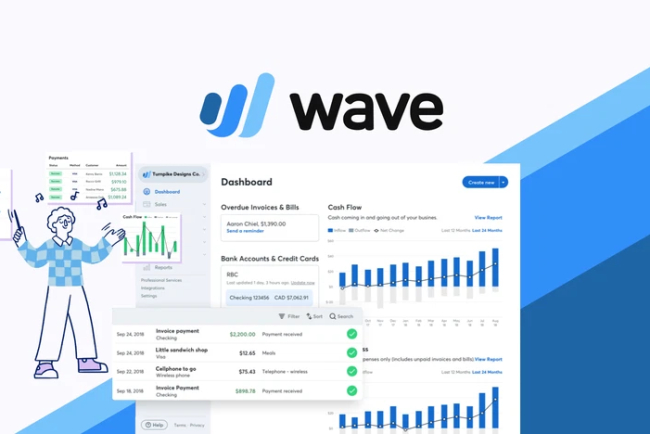Can ChatGPT Do My Bookkeeping? The Future of AI-Powered Financial Management
Can ChatGPT really handle your bookkeeping, or is that just a futuristic dream? Imagine AI taking care of invoices, expenses, and reports in seconds—freeing you to focus on growing your business. Yet, when it comes to taxes, compliance, and big financial decisions, human expertise still rules. The truth isn’t black or white—it’s a fascinating balance of automation and strategy. Discover how startups are saving thousands, where AI falls short, and why the smartest businesses are blending machine efficiency with human judgment. This isn’t just about bookkeeping—it’s about the future of financial management, and the answer might surprise you.

In the bustling world of entrepreneurship, where every minute counts and every dollar matters, business owners are constantly seeking ways to streamline operations and reduce costs. One question that's increasingly on the minds of startup founders and small business owners is: "Can ChatGPT handle my bookkeeping?"
The answer, like most things in business, isn't black and white. While AI tools like ChatGPT have revolutionized many aspects of business operations, the realm of financial management requires a nuanced understanding of both opportunities and limitations. Let's dive deep into this fascinating intersection of artificial intelligence and financial stewardship.
The Foundation: What Traditional Bookkeeping Really Entails
Before we explore AI's role in bookkeeping, it's crucial to understand what traditional bookkeeping actually involves. Far from being just "number crunching," bookkeeping forms the financial backbone of every successful business.
The Core Components of Bookkeeping
Traditional bookkeeping encompasses several critical functions:
Transaction Recording: Every business transaction—from the smallest office supply purchase to major equipment investments—must be accurately recorded. This includes sales, purchases, receipts, and payments, each requiring proper categorization and documentation.
Account Reconciliation: Regular reconciliation of bank statements, credit card accounts, and other financial records ensures accuracy and identifies discrepancies before they become major issues.
Financial Statement Preparation: Creating profit and loss statements, balance sheets, and cash flow statements that provide insights into business performance and financial health.
Tax Documentation: Maintaining organized records for tax preparation, ensuring compliance with local, state, and federal requirements.
Accounts Payable and Receivable Management: Tracking what the business owes and what it's owed, managing payment schedules, and maintaining healthy cash flow.
Why Accuracy Matters More Than Ever
In today's regulatory environment, accuracy in bookkeeping isn't just about good business practice—it's about survival. Consider the story of TechStart Inc., a promising software startup that faced an IRS audit three years after launch. Due to inconsistent bookkeeping practices, they couldn't properly document their R&D expenses, resulting in $50,000 in additional taxes and penalties that nearly forced them to shut down.
This scenario illustrates why accuracy, compliance, and organization aren't optional—they're fundamental to business sustainability. Every transaction tells a story, and that story must be clear, accurate, and verifiable.
Enter the AI Revolution: Understanding ChatGPT's Capabilities
ChatGPT and similar AI tools have emerged as powerful assistants in various business functions. But what exactly can these tools do in the context of bookkeeping?
Where AI Excels: The Automation Advantage
Data Entry and Classification: AI can process large volumes of transaction data, automatically categorizing expenses based on vendor names, amounts, and patterns. For instance, it can instantly recognize that a payment to "Office Depot" should be categorized as "Office Supplies" rather than requiring manual input each time.
Invoice Processing: AI can extract key information from invoices—vendor details, amounts, dates, and line items—converting physical or PDF documents into structured data for bookkeeping systems.
Expense Pattern Recognition: By analyzing historical data, AI can identify unusual spending patterns that might indicate errors or potential fraud, acting as an early warning system.
Financial Reporting Automation: AI can generate basic financial reports, create summaries of monthly expenses, and even draft preliminary profit and loss statements based on recorded transactions.
Real-time Insights: Unlike traditional bookkeeping that often involves end-of-month processing, AI can provide instant insights into cash flow, spending trends, and budget variances.
Practical AI Applications in Action
Consider Maria's boutique consulting firm. She uses AI to:
- Automatically categorize her business credit card transactions
- Extract data from client invoices for accounts receivable tracking
- Generate monthly expense summaries for budget reviews
- Create basic cash flow projections based on historical patterns
This automation saves her approximately 8 hours per month—time she can reinvest in client work that directly generates revenue.
The Reality Check: Where Human Expertise Remains Essential
While AI's capabilities are impressive, certain aspects of bookkeeping require human judgment, contextual understanding, and professional expertise that current AI technology simply cannot replicate.
The Irreplaceable Human Touch
Complex Tax Compliance: Tax laws are intricate, constantly changing, and often require interpretation based on specific business circumstances. While AI can help organize documents, it cannot make strategic tax decisions or navigate complex regulatory requirements.
Judgment-Based Decisions: Determining whether an expense should be capitalized or expensed, how to handle unusual transactions, or making adjustments for accrual accounting requires professional judgment that AI lacks.
Regulatory Filings: Government filings, audit support, and compliance with industry-specific regulations require human oversight and professional accountability.
Strategic Financial Planning: While AI can analyze historical data, creating business strategies, interpreting market conditions, and making forward-looking financial decisions require human insight and experience.
Case Study: When AI Falls Short
Consider the experience of GreenTech Solutions, a renewable energy startup that initially relied heavily on AI for bookkeeping. When they applied for a significant business loan, their AI-generated financial statements contained several classification errors that raised red flags with lenders. The transactions were technically recorded correctly, but lacked the nuanced categorization and context that a human accountant would have provided. This resulted in loan delays and ultimately cost them a time-sensitive expansion opportunity.
Opportunities: The Bright Side of AI-Powered Bookkeeping
Despite its limitations, AI offers compelling advantages that are reshaping how businesses approach financial management.
Cost-Efficiency Revolution
For startups and small businesses, the cost savings can be substantial. Traditional bookkeeping services can cost anywhere from $500 to $2,500 per month, depending on transaction volume and complexity. AI tools can handle many routine tasks for a fraction of this cost, potentially saving businesses $3,000 to $20,000 annually.
Scalability Without Proportional Cost Increases
As businesses grow, transaction volumes increase exponentially. While traditional bookkeeping costs scale proportionally, AI can handle increased volume with minimal additional cost. A business that processes 100 transactions per month versus 1,000 transactions faces similar AI processing costs but dramatically different human labor costs.
Accessibility for Resource-Constrained Startups
Many startups delay proper bookkeeping due to cost constraints, often resulting in financial chaos down the road. AI tools make basic financial management accessible from day one, helping establish good practices early in the business lifecycle.
Enhanced Accuracy Through Consistency
Humans make mistakes, especially during repetitive data entry tasks. AI doesn't get tired, distracted, or make transcription errors. When properly configured, AI can maintain consistent accuracy levels that exceed human performance for routine tasks.
Limitations: Understanding the Boundaries
The Accuracy Paradox
While AI excels at consistent processing, it can consistently make the same mistakes. If the AI is trained on incorrect categorization patterns or doesn't understand industry-specific nuances, it may perpetuate errors across all transactions.
Data Privacy and Security Concerns
Financial data is sensitive, and using cloud-based AI tools raises legitimate privacy concerns. Businesses must carefully evaluate data handling practices, security measures, and compliance with regulations like GDPR or industry-specific requirements.
Lack of Contextual Understanding
AI processes information based on patterns and rules but lacks the contextual understanding that comes from business experience. It might categorize a "team building event" as entertainment rather than employee training, potentially affecting tax deductions.
Integration Challenges
Most businesses use multiple software systems—CRM, inventory management, payroll, and banking platforms. AI tools must integrate seamlessly with these systems, which isn't always straightforward and may require technical expertise.
The Future Landscape: Hybrid Models and Emerging Trends
The future of bookkeeping isn't about choosing between AI and human expertise—it's about finding the optimal combination of both.
The Rise of Hybrid Solutions
Forward-thinking businesses are adopting hybrid models where:
- AI handles routine data entry, categorization, and basic reporting
- Human professionals focus on analysis, strategy, compliance, and complex decision-making
- Regular human oversight ensures AI accuracy and catches edge cases
Industry Transformation Trends
Real-time Financial Management: AI enables continuous rather than periodic bookkeeping, providing real-time financial visibility that supports better business decisions.
Predictive Financial Analytics: Beyond recording what happened, AI is beginning to predict cash flow challenges, identify optimization opportunities, and forecast financial performance.
Enhanced Audit Trails: AI can create more detailed audit trails than traditional methods, improving transparency and compliance while reducing audit costs.
Customized Financial Insights: AI can generate personalized financial insights based on industry benchmarks, seasonal patterns, and business-specific metrics.
Expert Perspectives
According to a recent survey by the American Institute of CPAs, 68% of accounting professionals believe AI will primarily augment rather than replace human accountants. The consensus is that AI will handle routine tasks while humans focus on higher-value strategic work.
Case Studies: Real-World Applications
Success Story: TechFlow Innovations
TechFlow, a mid-sized software development company, implemented a hybrid AI-human bookkeeping model in 2023. They use AI for:
- Automated expense categorization (saving 15 hours/month)
- Invoice data extraction and processing
- Monthly financial report generation
- Cash flow pattern analysis
Meanwhile, their human accountant focuses on:
- Tax strategy and compliance
- Financial analysis and planning
- Investor reporting
- Strategic decision support
Results: 40% reduction in bookkeeping costs, 60% faster month-end closing, and improved financial visibility that helped them secure Series A funding.
Learning Experience: RetailMax
RetailMax, an e-commerce startup, initially used AI alone for bookkeeping to minimize costs. Within six months, they discovered:
- Inventory costs were incorrectly classified, affecting gross margin calculations
- Sales tax obligations were missed due to multi-state complexity
- Cash flow projections were inaccurate due to seasonal pattern misinterpretation
They transitioned to a hybrid model, using AI for data processing while adding quarterly human review and strategic guidance. This change prevented a potential $25,000 tax penalty and improved their financial decision-making.
Making the Decision: Is AI Right for Your Business?
The decision to incorporate AI into your bookkeeping depends on several factors:
Business Characteristics That Favor AI Implementation
- High Transaction Volume: Businesses processing hundreds of transactions monthly benefit most from AI automation
- Standardized Operations: Companies with predictable, repetitive transactions are ideal candidates
- Cost Sensitivity: Startups and small businesses with limited resources can achieve professional-level bookkeeping at reduced costs
- Growth Trajectory: Fast-growing businesses need scalable solutions that don't require proportional staff increases
Situations Requiring Human Expertise
- Complex Business Models: Companies with multiple revenue streams, international operations, or complex ownership structures
- Heavily Regulated Industries: Healthcare, finance, and other regulated sectors require specialized compliance knowledge
- Strategic Financial Planning: Businesses requiring sophisticated financial analysis, forecasting, and strategy development
- High-Stakes Decision Making: Companies where financial mistakes could have severe consequences
Practical Implementation Strategy
If you're considering AI for bookkeeping, here's a practical roadmap:
Phase 1: Assessment and Preparation
- Evaluate your current bookkeeping processes and pain points
- Identify which tasks are repetitive and rule-based
- Assess your data quality and organization
- Research AI tools that integrate with your existing systems
Phase 2: Pilot Implementation
- Start with low-risk, high-volume tasks like expense categorization
- Maintain parallel human oversight during the initial period
- Monitor accuracy and identify areas needing adjustment
- Gradually expand AI responsibilities as confidence builds
Phase 3: Optimization and Scaling
- Refine AI rules and categories based on learning
- Integrate AI insights into business decision-making
- Establish regular human review schedules
- Plan for scaling as business grows
The Verdict: Collaboration Over Replacement
So, can ChatGPT do your bookkeeping? The answer is both yes and no.
Yes, AI can handle many routine bookkeeping tasks with impressive efficiency and accuracy. It can process transactions, categorize expenses, generate basic reports, and provide valuable insights—all while reducing costs and saving time.
No, AI cannot replace the strategic thinking, professional judgment, and compliance expertise that human accountants provide. Complex business decisions, tax strategy, and regulatory compliance require human intelligence and professional accountability.
The most successful approach combines AI's efficiency with human expertise, creating a hybrid model that delivers the best of both worlds: cost-effective automation for routine tasks and professional guidance for strategic decisions.
Critical Questions for Business Owners
As you consider AI for your bookkeeping needs, ask yourself:
- Would you trust AI alone with decisions that could affect your business's financial future?
- How important is having a human professional who understands your business context and industry?
- Are you prepared to invest time in properly configuring and monitoring AI systems?
- Does your business have the complexity that requires human judgment, or are your needs primarily routine data processing?
The answers to these questions will guide you toward the right balance of AI automation and human expertise for your unique situation.
Transform Your Business Operations Today
While AI continues to revolutionize bookkeeping and financial management, successful businesses need comprehensive solutions that go beyond just managing numbers. That's where Gomsu Information Technologies comes in.
At Gomsu Information Technologies, we understand that modern businesses require integrated solutions that work seamlessly together. Whether you're a startup looking to establish robust financial processes or an established company seeking to optimize operations, we offer a complete suite of business solutions:
???? Advanced POS Systems - Streamline your sales operations with intelligent point-of-sale solutions that integrate seamlessly with your bookkeeping systems.
???? Comprehensive CRM Solutions - Manage customer relationships effectively while maintaining clear financial tracking of sales pipelines and customer transactions.
???? Learning Management Systems (LMS) - Whether you're training employees on financial procedures or building customer education programs, our LMS solutions scale with your needs.
⚡ Business Process Automation - Beyond bookkeeping, automate workflows across your entire organization to increase efficiency and reduce human error.
???? Integrated Payroll Services - Ensure your employee compensation is seamlessly integrated with your financial management systems.
???? Digital Marketing Solutions - Track marketing ROI with precision while maintaining clear connections between marketing spend and revenue generation.
Why Choose Gomsu Information Technologies?
Reliability You Can Trust: With years of experience helping businesses implement technology solutions, we understand the critical importance of accurate, dependable systems.
Scalable Solutions: Our systems grow with your business, whether you're processing 100 transactions per month or 10,000.
Integrated Approach: Rather than juggling multiple vendors, get comprehensive solutions that work together seamlessly.
Expert Support: Our team provides ongoing support to ensure your technology investments deliver maximum value.
Security First: We prioritize data security and compliance, giving you peace of mind about your sensitive business information.
Exclusive Offer for Forward-Thinking Business Owners
For readers ready to transform their business operations, we're offering exclusive discounts on our comprehensive business solution packages:
- 25% off your first year of integrated POS and CRM solutions
- Free implementation and training for automation systems
- Complimentary consultation to assess your specific business needs
- Priority support for the first six months
Don't let outdated processes hold your business back. Join the growing number of successful companies that have transformed their operations with Gomsu Information Technologies.
Ready to get started? Contact our team today at [contact@gomsu.tech] or visit our website to schedule your free consultation. Let's discuss how we can help you build a more efficient, profitable, and scalable business.
Conclusion: Embracing the Future of Financial Management
The question "Can ChatGPT do my bookkeeping?" has revealed a complex landscape of opportunities and limitations. While AI tools like ChatGPT offer impressive capabilities for routine financial tasks, the most successful businesses will be those that thoughtfully combine AI efficiency with human expertise.
The future of bookkeeping isn't about replacement—it's about enhancement. AI handles the repetitive, time-consuming tasks that consume valuable resources, while human professionals focus on strategy, compliance, and complex decision-making that drives business success.
As you consider your bookkeeping strategy, remember that the goal isn't just to record transactions—it's to build a financial foundation that supports your business's growth and success. Whether you choose pure AI, traditional human bookkeeping, or a hybrid approach, the key is matching your solution to your business's unique needs and growth trajectory.
The businesses that thrive in the coming decade will be those that embrace technology while recognizing the irreplaceable value of human insight and expertise. By understanding both the possibilities and limitations of AI in bookkeeping, you're already taking the first step toward making informed decisions that will serve your business well into the future.
Found this article helpful?
Like this post if it provided valuable insights for your business
Share it with fellow entrepreneurs who might benefit from understanding AI's role in bookkeeping
Leave a comment below with your thoughts or experiences using AI in financial management
Have questions? Ask them in the comments, and we'll provide detailed answers
Subscribe to our newsletter for more in-depth guides on leveraging technology for business success
Your feedback helps us create better content, and your questions might inspire our next comprehensive guide. Join the conversation and become part of a community of forward-thinking business owners who are shaping the future of business operations.
What's your take? Would you trust AI with your business finances, or do you believe human oversight is non-negotiable? Share your perspective—we'd love to hear from you!
What's Your Reaction?





















